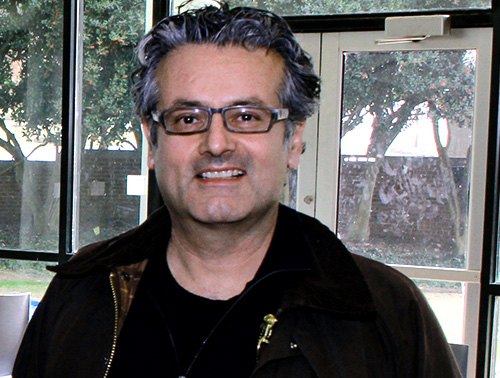
Sabir Khan
Associate Professor, Director of the Architecture International Education Program
Sabir Khan
Associate Professor, Director of the Architecture International Education Program
Education
B.A. in Architectural History and Theory from Princeton University in 1983
Master of Architecture from Rice University in 1987
Keywords
Cross-cultural Design, Architecture Awards, Repair, Public Spaces / Public Life, Digital Technology and the City
Biography
Sabir Khan has a joint appointment in the School of Architecture and in the School of Industrial Design (2011-current). Prior to that he served as Associate Dean of the College for undergraduate studies and creative activity (2002-2011) and Assistant Professor in the School of Architecture (1995-2002). In 1999 he developed the curriculum for the Common First Year, the multi-disciplinary program for all undergraduate students entering the college. During the years he directed the CFY (1999-2011) the program served from 140 to 280 freshmen each year. In addition to his primary appointment in the College of Design, he directs the Barcelona Summer Study Abroad program for the College of Computing.
As a teacher, designer, and scholar, he is interested in how cross-cultural and cross-disciplinary framings inform the production, consumption, and interpretation of architecture and design. His interest in design pedagogy stems from a strong belief that the potential of architecture -- as a discipline, a discourse, and a practice -- lies in being fully in the world. He has developed and taught design courses to engineering, computing, and liberal arts majors. As part of this process, he collaborates with colleagues in engineering and computing on funded research projects.
His current research is focused in two areas. The first looks Disrepair, Maintenance, and Repair in Architecture and Design -- at the scale of the product, the building, and the city. For 2018, he has organized sessions on the topic at the CAA College Art Association Annual Meeting and at the ACSA Association of Collegiate Schools of Architecture Annual Meeting. A conference on campus in March will give these topics a broader exposure among Georgia Tech colleagues.
The second looks at eight ongoing architecture awards programs, both at the projects (nominated, shortlisted, and awarded) as well as the discourse they generate. He has organized a session on this subject for the SAH Society of Architectural Historians Annual Meeting in April 2018.
Cross-American Traverses: The Triangular Practices of Ecosistema Urbano and Fake Industries. ACSA International Conference in Santiago, Chile. June 2016.
Science-Informed Design Pedagogies. Society for Integrative and Comparative Biology Annual Meeting in Portland. Paper presented with Jeannette Yen. January 2016.
Pedagogical Strategies for Bio-Inspired Design. Paper and Workshop at the Living Machines IV International Conference. Barcelona, July 2015.
Aga Khan Award for Architecture: Discursive Field and Archive. Paper presented in the Representations of Tradition sessions. International Association for the Study of Traditional Environments Biennial Conference. Kuala Lumpur, December 2014.
Working with and For Others: Architecture in an Expanded Field. Paper presented in the Emergent Models of Architectural Education: Pedagogy, Curriculum + Students sessions. ACSA International Conference. Seoul, June 2014.
Design Literacy and Civic Literacy: The Beltline, An American Example in Media Res. Paper presented in the “Civic Engagement: Alternative Design Practices” sessions. ACSA International Conference. Barcelona, June 2012.
Making Sense of the Cultural Production of Others. ACSA Annual Meeting. New Orleans, March 2010